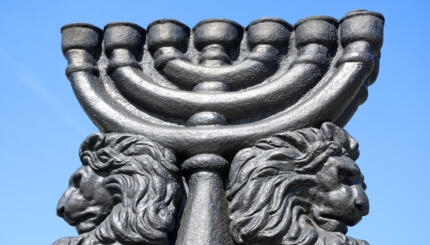Commentary on Parashat Vayakhel-Pekudei, Exodus 35:1 - 40:38
Passover is among the gifts that the Jewish people has given the world. It is the ultimate expression of hope and optimism in the midst of the deepest despair. For me, this sense is best expressed in the succinct plaint of Psalm 130 which begins, “From the depths I called to You.” In the context of the psalmist’s plea is the faith that God will indeed raise the seeker from the depths.
It is not surprising that there are four special Sabbaths that lead us to the celebration and observance of Passover, each one preparing us in its own way for the anticipated redemption contained in the holiday experience. The parallel tracks of moving from slavery and from the Torah’s story gird this sense of optimism. Because this week’s portion, Vayakhel-Pekudei, is a so-called “double portion,” and it is the last of the special Sabbaths, there is twice the opportunity for a conclusive statement of such hope, the kind of hope and faith that yields to no measure of darkness.
Perhaps it is one of the reasons why this portion follows the episode of the golden calf, and why both come so close to Passover. Even such an incident could not derail the redemption of the Jewish people.
This portion opens with Moses assembling the people once again. He repeats the words of God as divine instructions to the people. He does so in open assembly so that all can hear. There was no secret to the process or to accessing the message. It is there for all who want to listen.
With your help, My Jewish Learning can provide endless opportunities for learning, connection and discovery.
Becoming One
Instructions about the Sabbath are mentioned first, according to the Sefat Emet, because on Shabbat the people become one. It is the power inherent in Shabbat. On Shabbat the mixed multitudes become one. We see it so often in our work. The Sabbath, no matter how it is observed or acknowledged, has the potential to bring people together–even when there is so much in the world that threatens to keep them apart.
Furthermore, to make sure that people understand that there are no secrets involved in this recipe for togetherness, Moses includes further instructions on building the place in which God will dwell, an indicator that God is in the midst of the people. The instruction–and the Instructor–are always close at hand.
Following Moses’ instructions, the gifts from the people flowed. While the gifts that are listed in the Torah text are physical, we know them to be gifts of the self, as well. The building of the dwelling place of God is open for any gifts that the people want to offer. There are no constraints placed on the giver or the gift.
The section concludes not with a celebration of the structure, but rather with a celebration of its purpose and the acknowledgment of God in the midst of the people, as noted by the cloud that covered it. When the cloud went up, the people would continue their journey.
Shabbat
Pronounced: shuh-BAHT or shah-BAHT, Origin: Hebrew, the Sabbath, from sundown Friday to sundown Saturday.
Torah
Pronunced: TORE-uh, Origin: Hebrew, the Five Books of Moses.


